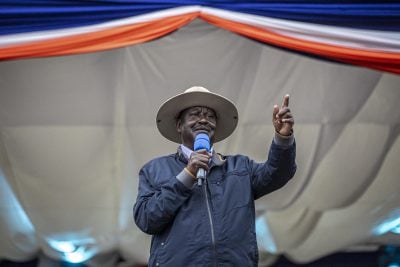The rollout of 5G mobile internet promises to be one of the most important technological advances of the 2020s.
Fifth-generation (5G) networks are able to transfer very large volumes of data much more quickly than previous generations of mobile internet. This is good news for people who want to watch videos or play games on mobile devices. More importantly, 5G will be an enabler for autonomous vehicles and other futuristic technologies that depend on connected networks.
Globally, the 5G rollout is already well underway. Mobile network operators began to offer 5G connections in the United States and South Korea in 2019. According to telecom equipment maker Ericsson, global 5G subscriptions are set to reach 1.5bn by the end of 2023. Africa, however, is falling behind.
So far, 5G is available in only around a dozen countries on the continent. Many more telecom operators are planning to offer 5G coverage, typically in urban areas, but this does not automatically mean that users can access 5G – indeed, only a tiny fraction of mobile devices in Africa are currently 5G-enabled. Mobile industry association GSMA predicts that even in 2025, 5G will account for just 4% of mobile connections in Africa.
The continent appears to be in danger of missing out on 5G’s expected economic benefits. Can Africa find a way to speed-up its 5G rollout – before it is too late?
Benefits and challenges
Mark Walker, associate vice president for sub-Saharan Africa at telecoms consultancy IDC, says the rapid connections made possible by 5G will be essential to unlock the benefits of rapidly developing technologies. “We’re starting to move into the area of big data, machine learning and AI, and the Internet of Things,” says Walker. “There’s a strong argument for the use of 5G. I think that’s where the benefit would be expected.”
Another potential benefit, particularly relevant for Africa, is that 5G can deliver fixed wireless internet access. This would mean that homes and businesses could receive a broadband connection delivered by a 5G signal transmitted from a cell tower. The technology is widely viewed as a cost-effective alternative to using fibre-optic cables to deliver broadband.
Despite the expected benefits, rolling out 5G networks will be far from straightforward, particularly outside Africa’s major cities. Walker says that installing 5G infrastructure is not particularly complex from a technological perspective. The challenge, he explains, is that “the range of 5G is shorter than 4G”, meaning that “you’re going to need more antennas to cover the space because of the nature of the microwaves”.
“It’s an affordability issue, rather than a technical capability issue,” he adds. As such, Walker believes that the main drivers of 5G adoption, at least initially, are likely to be large enterprises, especially those that can benefit from the data processing benefits of 5G.
“If I was a telco, the focus for me on 5G would be to identify the enterprise space, the large conglomerates, and then move down that stack to the medium-sized companies, small companies and so on.”
Rural rollout
The difficulties of extending 5G coverage to ordinary consumers, particularly in sparsely populated rural areas of Africa, will mirror those seen with previous generations of mobile internet.
Africa has enjoyed considerable success in using mobile internet as a “leapfrogging” technology. Kenya, famously, is a world leader in mobile money transfers, for example.
But high-quality connections are far from the norm across the continent. GSMA estimates that 190 million people in sub-Saharan Africa – 17% of the population – lacked any form of mobile internet access in 2021. That same year, 4G accounted for only 17% of connections in Africa – still behind 2G at 27% and 3G at 56%.
Predicting how long it will take to extend 5G beyond Africa’s major cities is “anybody’s guess” says Kenechi Okeleke, director of social and regional research at GSMA Intelligence.
“The 5G rollout in Africa will take a different format to what we’ve seen in many of the pioneer markets,” he says, noting that network operators in countries such as the US and South Korea have competed aggressively to extend 5G coverage even into rural areas. “We’re not likely to see that in Africa. The 5G rollout in Africa will most likely take a phased approach, whereby operators roll out 5G based on the need and demand for it.”
From the perspective of mobile network operators, says Okeleke, a key requirement is to have “the right usage volumes on the 5G networks to be able to generate returns on investment”.
“As an operator,” he says, “you may be able to deploy 5G, but you also have to think about the ability of users in that location to get their hands on a 5G device. There’s no point building a 5G network where people are not able to afford the devices they need to access that network.”
Affordability
GSMA projects that in 2030, 5G will still only account for 20% of mobile connections in Africa. This would leave the continent lagging far behind other emerging market regions – 5G is expected to make up 58% of mobile connections in Latin America and 36% in India by 2030.
Could Africa ultimately speed-up the 5G rollout and extend coverage more quickly than GSMA predicts? “It is possible,” Okeleke says, “but for that to happen a lot of things will have to move together at faster pace.”
He notes that telecoms operators need to shut down legacy 2G and 3G networks to free up spectrum that can be allocated to 5G. Regulators, meanwhile, will need to speed up the process of assigning 5G spectrum to operators to incentivise 5G deployment.
But the most important roadblock is the cost of 5G-enabled devices. In Kenya, leading mobile operator Safaricom has already extended 5G coverage across urban areas after launching its 5G network last year. But the company’s CEO, Peter Ndegwa, pointed out at a 5G launch event in October 2022 that less than 1% of Kenya’s smartphones are 5G-enabled.
“Until 5G device prices begin to come down, it’s hard to see adoption levels rising faster than what we have currently projected,” says Okeleke.
In fact, the reality that only the wealthiest segment of the population can afford a 5G-enabled device makes potential sources of concessionary finance cautious about backing the 5G rollout in Africa.
“In our own investments, we are still focused on other ways of increasing usage,” says Abhinav Sinha, managing director and head of technology and telecoms at British International Investment (BII), the UK’s development finance institution. He says that BII would consider investing in 5G in the future. But it has not yet done so, given that consumers who who can’t afford a 5G device won’t see immediate benefits.
Nevertheless, Okeleke believes that there are at least some signs that Africa’s 5G rollout is gathering momentum. “A couple of years ago, if you talked to stakeholders in the region, a good amount of them would have said Africa is not yet ready for 5G,” he says. “But if you talk to those same stakeholders today, a greater proportion of them will agree that 5G should be rolled out.”
Related articles
Want to continue reading? Subscribe today.
You've read all your free articles for this month! Subscribe now to enjoy full access to our content.
Digital Monthly
£8.00 / month
Receive full unlimited access to our articles, opinions, podcasts and more.
Digital Yearly
£70.00 / year
Our best value offer - save £26 and gain access to all of our digital content for an entire year!

 Sign in with Google
Sign in with Google 



